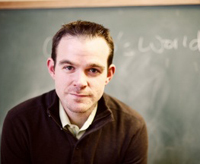
Heath Carter, a graduate student in the University of Notre Dame’s Department of History, has been awarded a Charlotte W. Newcombe Doctoral Dissertation Fellowship for his work on the intersection of American religious and working-class history in the 19th and 20th centuries.
Administered by the Woodrow Wilson National Fellowship Foundation, the Newcombe fellowship program supports Ph.D. students in the humanities and social sciences whose work has “significant potential for advancing academic scholarship related to ethics and/or religion.” Out of more than 500 applicants, just 21 students were selected to receive fellowships for 2011–2012.
“I am deeply grateful to the foundation for its support of my project,” says Carter, “and am delighted to know that the senior scholars who vetted my application deemed my work worthy of this honor.”
Titled “Union Made: Working People and the Rise of Social Christianity in Chicago, 1865–1914,” Carter’s dissertation examines the struggles within Catholic and Protestant churches as the institutions wrestled with “the labor question.”
A Church Battleground
“During the late 19th century, northern American cities like Chicago experienced deep unrest as a vast, poor, and predominantly foreign-born work force faced off against a small but fabulously wealthy elite,” Carter says. “Strikes, riots, and violent confrontations in the streets were common, many of these sparked by questions about wages, hours, working conditions, etc.
“My research asks how the Christian churches made their peace with an economic system within which the mighty were not cast down and the lowly were not exalted, as well as how Americans more broadly came to accept the dramatic inequalities that shape our society still today.”
Carter says poring over census data and church membership rolls helped him understand who was sitting in the pews of the churches he studied—a diverse collection of carpenters, lawyers, painters, and financiers, among others. He draws extensively on reports from labor, socialist, and religious periodicals, as well as Chicago’s daily newspapers and foreign language press.
“I have found that the clergy often took the side of the elite in the battles of the day,” he says, “but that workers persistently challenged the cozy relationship between churches and ‘capital.’”
According to Mark Noll, Francis A. McAnaney Professor of History in the College of Arts and Letters and Carter’s dissertation adviser, this new research is a “significant re-interpretation of the previous understanding of the churches and labor … and is particularly important for a range of scholars.”
Further Recognition
Carter has already won several honors for a chapter of the dissertation he adapted into an article, “Scab Ministers, Striking Saints: Christianity and Class Conflict in 1894 Chicago,” which was published in American Nineteenth Century History.
The Working Class Studies Association awarded this piece the 2011 C.L.R. James award for best article of the year, a competition open to all scholars working in the field, not just graduate students. The judges said Carter’s work “offers a thorough and compelling analysis of the intersection between labor struggles and struggles within religious groups about the meaning and practice of Christianity.”
At Notre Dame, Carter’s article won the Higgins Labor Center’s John Joyce Prize for Best Paper in Working-Class Studies and the 2011 Phillip Gleason Prize for the best paper published by a graduate student in the Department of History.
During summer 2011, Carter will also be one of four Ph.D. candidate fellows working on the University’s Religion Across the Disciplines, a new initiative investigating the influence of religion in history, international relations, literature, music, and sociology, as well as the influence those fields have on religion itself.
Learn More >
- Department of History
- Mark Noll faculty page
- Heath Carter research website
- Higgins Labor Center
- Mellon Initiative on Religion Across the Disciplines
- Charlotte W. Newcombe Foundation
- Woodrow Wilson National Fellowship Foundation
- Working Class Studies Association
- “Scab Ministers, Striking Saints: Christianity and Class Conflict in 1894 Chicago”


